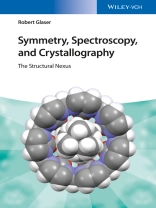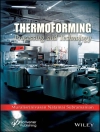Written in a clear and understandable manner, this book provides a comprehensive, yet non-mathematical, treatment of the topic, covering the basic principles of symmetry and the important spectroscopic techniques used to probe molecular structure.
The chapters are extensively illustrated and deal with such topics as symmetry elements, operations and descriptors, symmetry guidelines, high-fidelity pseudosymmetry, crystallographic symmetry, molecular gears, and experimental techniques, including X-ray crystallography and NMR spectroscopy. As an additional feature, 3D animations of most of the structures and molecules covered are available online at wiley.com. As a result, chemists learn how to understand and predict molecular structures and reactivity.
Authored by a renowned expert with numerous publications and an excellent track record in research and teaching, this is a useful source for graduate students and researchers working in the field of organic synthesis, physical chemistry, biochemistry, and crystallography, while equally serving as supplementary reading for courses on stereochemistry, organic synthesis, or crystallography.
Daftar Isi
From the Author’s Desk XIII
1 Symmetry/Pseudosymmetry: Chirality in Molecules, in Nature, and in the Cosmos 1
1.1 Introduction 1
1.2 Rudimentary Group Theory, Isometry, and Symmetry 4
1.3 Asymmetric versus Chiral: The I-Symmetry of Viral Capsids 7
1.4 The Birth of Chirality as a Chemical Concept 9
1.5 Apparent Symmetry (High-Fidelity Pseudosymmetry) and the Quantification of Distortion from the Ideal 11
1.6 Chirality in Form and Architecture: Symmetry versus Broken Symmetry 16
1.7 Chirality in Nature: Tropical Storms, Gastropods (Shells), and Fish 17
1.8 Extraterrestrial Macroscale Chirality: Spiral Galaxies, Martian Sand Devils, Jovian Great Red Spot, Neptune’s Great Dark Spot, and Venusian South-Pole Cloud Vortex 20
1.9 Analyses of Amino Acid Chirality in Extraterrestrial Samples with Gas–Liquid Chromatography Chiral Columns 23
2 Enantiospecificity of Pheromones, Sweeteners, Fragrances, and Drugs 25
2.1 Enantiospecificity of Pheromones, Sweeteners, and Fragrances 25
2.2 The Importance of Chirality in Drug Therapy 27
3 Bonding Parameters and the Effect of Local Environment on Molecular Structure 33
3.1 Symmetry Arguments and the Effect of the Environment on Molecular Structure 33
3.2 The Effect of Local Environment on Molecular Models and Molecular Structure 34
3.3 Torsion Angles and Molecular Conformation 35
3.4 Symmetry Considerations of Atomic Orbital Hybridization and Bonding Parameters 39
4 Historical Development of Structural Chemistry: From Alchemy to Modern Structural Theory 41
4.1 Hemihedralism in Quartz Crystals: Setting the Stage for the Birth of Stereochemistry 41
4.2 Tartaric Acid and Alchemy 45
4.3 Hemihedralism in Crystalline Tartaric Acid Salts: The Birth of Molecular Chirality 46
4.4 Gift for Prelog’s Retirement: A Matched Pair of u′, x′-Hemihedral Faced Right- and Left-Handed Quartz Crystals 54
4.5 Early Structural Representations of Organic Substances and the Development of Modern Structural Concepts 55
4.6 Fischer Projections to Determine α- and β-Anomeric Configurations 64
5 Chiroptical Properties 67
5.1 The Language of Symmetry, Isomerism, and the Characterization of Symmetry Relationships within and between Molecules 67
5.2 Chiroptical Properties: Circular Birefringence, Optical Rotatory Dispersion, and Circular Dichroism 68
5.3 Miller Indices and Fractional Coordinates in Crystallography 74
5.4 Scanning Tunneling Microscopy 78
5.5 Direct Visualization of an Enantiomer’s Absolute Configuration in the Gas Phase 82
6 Symmetry Comparison of Molecular Subunits: Symmetry in Nuclear Magnetic Resonance Spectroscopy and in Dynamic NMR 85
6.1 Symmetry in NMR Spectroscopy 85
6.2 Symmetry Comparison of Molecular Subunits, Topicity Relationships 87
6.3 Dynamic Stereochemistry, Dynamic Nuclear Magnetic Resonance Spectroscopy (DNMR) 90
6.4 Use of Permutations in DNMR for Topomerization-, Enantiomerization-, and Diastereomerization-Exchange Processes 92
7 Prochirality, Asymmetric Hydrogenation Reactions, and the Curtin–Hammett Principle 99
7.1 Prochirality of Enantiotopic Subunits 99
7.2 Homogeneous Hydrogenation by Rhodium I/Achiral Diphosphine Catalysts Differentiates the Diastereotopic Prochiral Faces of Olefins 101
7.3 Homogeneous Hydrogenation by Rhodium I/(Chiral Diphosphine) Catalysts Differentiates the Enantiotopic Prochiral Faces of Olefins: The Curtin–Hammett Principle 104
8 Stereogenic Elements, Chirotopicity, Permutational Isomers, and Gear-Like Correlated Motion of Molecular Subunits 113
8.1 Stereogenicity, Stereogenic Elements, Chirotopicity, and the Ambiguity of Some Stereochemical Terms 113
8.2 Triarylamine Propellers 115
8.3 Dynamic Stereochemistry of Permutational Isomers: Correlated Motion in Triarylamines 116
8.4 Relative Stereochemical Descriptors: Retro-Inverso Isomers 122
9 Symmetry in Extended Periodic Arrays of Molecular Crystals and the Relevance of Penrose Tiling Rules for Nonperiodic Quasicrystal Packing 127
9.1 Symmetry in Extended Arrays/Molecular Crystals 127
9.2 Achiral Periodic Arrays of Chiral Objects and Racemic Compound Crystal Lattices 132
9.3 Chiral Periodic Arrays 132
9.4 Occupancy of Special Positions in Periodic Arrays 136
9.5 The Bragg Law and X-Ray Diffraction 139
9.6 The Interferogram Phenomenon in Single-Crystal X-Ray Crystallography 140
9.7 X-Ray Fiber Diffraction 143
9.8 Penrose Tiling Matching Rules, Quasicrystal Packing, and Dodecahedrane 145
10 Multiple Molecules in the Asymmetric Unit, “Faking It”; Pseudosymmetry Emulation of Achiral Higher Order Space Filling in Kryptoracemate Chiral Crystals 149
10.1 Multiple Molecules within an Asymmetric Unit 149
10.2 “Faking It”: Pseudosymmetry Emulation of Achiral Higher-Order Space Filling in Kryptoracemate Chiral Crystals 151
10.3 Desymmetrization of Platonic-Solid Geometries Resulting from Crystallographic Symmetry Constraints 161
10.4 Mobility of Cubane and Dodecahedrane (CH)n Spherical Molecules within a Crystal Lattice 164
11 Platonic-Solid Geometry Molecules and Crystallographic Constraints upon Molecular Geometry, Symmetry Distortions from Ideality 169
11.1 Geometrical Considerations in High-Symmetry Molecules 169
11.2 Syntheses Strategies of High-Symmetry Chiral Molecules 171
11.3 Ethano-Bridge Enantiomerization of T-Symmetry Molecules 173
11.4 Self-Assembly of T-Symmetry Chiral Molecules 176
11.5 Enantiomerization of T-Symmetry Clusters 180
11.6 Tetradentate Edge-Linker Units Separated by a Spacer 183
11.7 Self-Assembly of O-Symmetry Chiral Molecules 184
11.8 O-Symmetry Ferritin Protein Octahedral Shell 185
11.9 Desymmetrization Resulting from Symmetry and Chemical Constraints 186
12 Solid-State NMR Spectroscopic/X-Ray Crystallographic Investigation of Conformational Polymorphism/Pseudopolymorphism in Crystalline Stable and Labile Hydrated Drugs 189
12.1 Divalent Anions Linking Conformationally Different Ammonium Cations 189
12.2 Cross Polarization/Magic Angle Spinning Solid-State NMR and X-Ray Crystallographic Studies on the Elusive “Trihydrate” Form of Scopolamine⋅Hydrobromide, an Anticholinergic Drug 191
13 NMR Spectroscopic Differentiation of Diastereomeric Isomers Having Special Positions of Molecular Symmetry 205
13.1 NMR Anisochronism of Nuclei at Special Positions of Molecular Symmetry 205
13.2 Pattern Recognition: A Graphical Approach to Deciphering Multiplet Patterns 207
14 Stereochemistry of Medium Ring Conformations 213
14.1 A Short Primer on Medium Ring Stereochemistry 213
14.2 Assignment of Equatorial-/Axial-Substituent Descriptors to Rings of Any Size 214
14.3 NMR Structure Determination of Medium-Ring Solution-State Conformations 216
14.4 Dynamic Disorder in Crystals 221
15 The Pharmacophore Method for Computer Assisted Drug Design 229
15.1 The Pharmacophore, Neurotransmitters and Synapse 229
15.2 The Pharmacophore Method for Computer Assisted Drug Design 231
15.3 Determination of the Dopamine Reuptake Site Pharmacophore 233
15.4 Methylphenidate (Ritalin⋅HCl) and (−)-Cocaine⋅HCl 235
15.5 Ritalin Versus Cocaine: Binding Affinity and Inhibitory Concentration 238
15.6 Second Generation Pharmacophore:The Orientation of the NH Proton 242
15.7 Avoidance of Adjacent Gauche+Gauche− Interactions 244
15.8 Static Disorder in N-Methyl Ritalin Crystals 246
15.9 Development of Specific Dopamine Reuptake Inhibitors (SDRI) 250
16 The X-Ray Structure–Based Method of Rational Design 255
16.1 X-Ray Crystallographic Structure–Based Molecular Design 255
16.2 The Different Primary Ammonium and Quaternary Aminium Binding Modes 258
16.3 Search for Unused Binding Sites 263
16.4 Primary Ammonium and Quaternary Aminium Binding Modes in CB[7 and 8] Complexes of Diamantane-4, 9-Substituted Guests 265
17 Helical Stereochemistry 269
17.1 Helical Stereochemistry 269
17.2 2nn-Symmetry Achiral Helical Pathways 273
17.3 “La Coupe du Roi”: Chiral Apple Halves Produced by a 42-Bisection 278
17.4 Intermeshing Molecular Threefold Helices: Symmetry, Chemical, and Phase Considerations 281
17.5 X-Ray Fiber versus Single-Crystal Diffraction Models 289
References 293
Index 301
Tentang Penulis
Robert Glaser is Emeritus Professor of Chemistry at Ben-Gurion University of the Negev, Beer-Sheva, Israel. He also holds an appointment as Visiting Professor in the Cross-Border Program in Biological Chemistry Budejoice (Budaweis), Czech Republic, administered by the University of South Bohemia/Universität Johannes Kepler in Linz, Austria. He also teaches at the Feinberg Graduate School of the Weizmann Institute of Science in Rehovot, Israel. Robert Glaser received his BA in chemistry at the University of Pennsylvania (USA) in 1963. Upon graduation he worked as a development chemist in the Structural Adhesives Division of the Pittsburg Plate Glass Company. Concurrently, he undertook part-time MSc studies in polymer chemistry at the Polytechnic Institute of Brooklyn, USA. After three years he began full-time studies, graduating Rutgers State University, USA, in 1969. From 1969 – 1971 he spent a two-year postdoctoral fellowship at Princeton University (USA) under guidance of Prof. P. von Rague Schleyer and Prof. R. Landgridge. After immigrating to Israel in 1971, he built up a new Department of Chemistry at the recently established University of the Negev in Beer-Sheva, where he became full professor in 1997. He has authored over 100 publications on the topic of organic and inorganic stereochemistry, molecular modeling, computer assisted drug design, and structure determination via NMR spectroscopic techniques.












